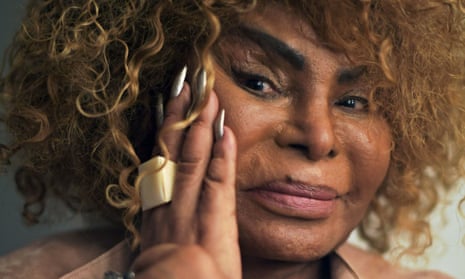Elza Soares, one of the greatest Brazilian singers of all time, has died at her beachside home in Rio after a legendary, genre-straddling six-decade career which made her a national treasure and a global star.
“The beloved and eternal Elza has gone to rest but she will forever remain in musical history and in our hearts and those of thousands of fans all around the world. Just as Elza Soares had wished, she sung until the end,” her family and team announced in a statement on Thursday afternoon.
There was an immediate outpouring of tributes to the 91-year-old samba singer, who died of natural causes and had been preparing to release a new album and perform a series of shows.
“Thank you, the greatest of Goddesses,” the actor Lázaro Ramos wrote on Instagram of the woman most Brazilians call simply “Elza”.
“The voice of the millenium,” tweeted the rapper Mano Brown in reference to the honour once bestowed upon her by the BBC.

The mandolin player Hamilton de Holanda hailed “Brazil’s great warrior woman” while the singer Maria Rita celebrated “this incredible woman of Light”.
“She is fucking amazing,” the actor Taís Araujo tweeted. “She always was and she always will be!”
Rio’s samba-loving mayor, Eduardo Paes, declared three days of mourning, tweeting: “Elza lives!”
Along the coast in São Paulo, Brazil’s largest city, the black activist and writer Preto Zezé said the heavens had opened, “as if God was weeping over Elza’s departure”.
Born in Moça Bonita, a favela on Rio’s impoverished westside in 1930, Soares endured a childhood of profound deprivation and tragedy. She was forced to marry by her father when she was 12, had her first child at the age of 13 and lost her second to hunger when she was just 15.
Nevertheless, she rose to become one of Brazil’s most successful and beloved artists, recording more than 30 albums after launching her singing career in the late 1950s at the height of the bossa nova movement.
Elza’s vast fan base reputedly included Buckingham Palace, with the singer performing for Queen Elizabeth II during a 1968 visit to Brazil. “She liked the samba, you know!” Elza later recalled. “She even broke protocol by tapping along to the rhythm with her feet. My God, isn’t life mad.”
On Thursday the British embassy in Brazil remembered the encounter: “It was a meeting of Queens! Rest in peace, Elza.”
The guitarist Zé Paulo Becker, who recorded and toured with the late singer, said: “Playing with her was incredible … The power she had up on stage was just amazing.”
“She might have been tired – but when she stepped out on stage she would become this volcano,” Becker added. “She was a true artist … and she will leave an immense hole.”
As well as a musical icon, the black singer was a powerful voice for social and racial justice and women’s rights. “Brazil is the most racist country we’ve got,” she said in an interview on the eve of her 90th birthday. “Things here are awful, it’s an illness with no cure, an absurd situation, disgusting. It’s my race that I’m watching be destroyed and we have to speak out and say enough’s enough.”
On Thursday Brazil’s former president, Luiz Inácio Lula da Silva, said the country had lost not only one of its most potent voices “but also a great woman, who always defended democracy and good causes”.
Elza died exactly 39 years to the day after the death of the love of her life – the legendary footballer Mané Garrincha – who she met during the 1962 World Cup and later married. During Brazil’s 1964-1985 dictatorship the couple were forced into exile in Italy after their home in Rio was shot at.
Outspoken and spectacularly elegant until the very end, Elza sent what was to be her last tweet on Wednesday lunchtime, 24 hours before her death. “My name is now, meu amor,” it said.










